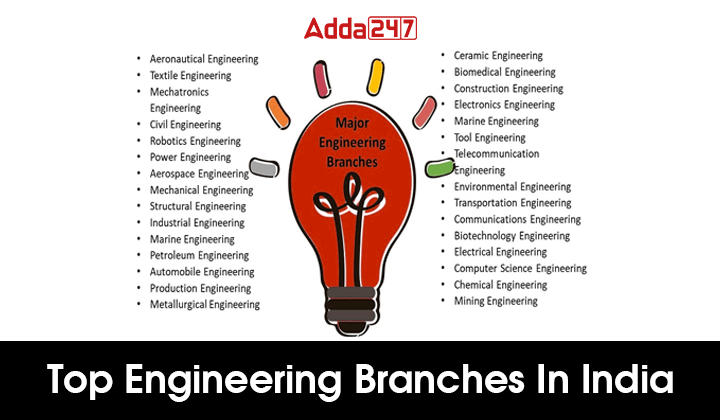Table of Contents
Top Engineering Branches In India
In India, the Engineering program is offered in several disciplines and branches. The candidates can opt for the specialization as per their choice for shaping their successful career in their desired field. Admission to Top Engineering Branches in India is offered through entrance exams and on a merit basis.
Candidates get confused about choosing the right branch for them in Engineering for great career prospects. In this article, we have discussed the Top Engineering Branches In India students may refer to deciding on a good branch to pursue Engineering Courses.
Also, Check: Latest Engineering Jobs 2023
Top Branches of Engineering In India
There are numerous engineering branches in India that are considered popular and have good career opportunities. Choosing the best branch in Engineering is necessary to boon the career. Candidates must select the right branch in engineering by analyzing their interests, demand of specialization and career goals. Here, we have mentioned some of the traditionally sought-after engineering branches in India for the ease of students:
Also, Check: List of Engineering Exams 2023
Computer Science and Engineering (CSE)
Computer Science and Engineering is the most popular branch of engineering among students nowadays. The CSE branch focuses on computer programming, software development, algorithms, artificial intelligence, data science, and related fields. Computer Science Engineering graduates are in high demand due to the boon of the IT Industry.
Electrical and Electronics Engineering (EEE)
Electrical and Electronics Engineering branch deals with electrical circuits, power systems, electronics, telecommunications, and control systems. It offers career opportunities in power generation, transmission, automation, telecommunications, and renewable energy sectors.
Mechanical Engineering (ME)
Mechanical Engineering involves the design, analysis, and manufacturing of mechanical systems and machines. It covers areas like thermodynamics, robotics, automotive engineering, aerospace, and HVAC. Mechanical Engineering graduates find opportunities in manufacturing, automotive, aerospace, and energy sectors.
Civil Engineering (CE)
Civil Engineering focuses on the design, construction, and maintenance of infrastructure, such as buildings, roads, bridges, dams, and water supply systems. It offers job opportunities in construction companies, infrastructure development firms, and government organizations.
Chemical Engineering
Chemical Engineering involves the operation of chemical processes, such as those used in the production of pharmaceuticals, polymers, petroleum, and other chemical products. Chemical Engg graduates get job opportunities in the chemical, petrochemical, pharmaceutical, and energy industries.
Electronics and Communication Engineering (ECE)
ECE deals with the study of electronic circuits, communication systems, signal processing, and telecommunications. Students having degrees in Electronics and Communication Engineering can get career exposure in the telecommunications, consumer electronics, and semiconductor industries.
Information Technology (IT)
Information Technology is a branch that focuses on information systems, software development, database management, and network administration. IT professionals are in demand in various industries, including software development, consulting, networking, and other IT services.
Aerospace Engineering
Aerospace is also a well-known branch of engineering that focuses on the design, development, and maintenance of aircraft, spacecraft, and related systems. It offers job opportunities in the aviation, defense, and space research sectors to graduates.
Biotechnology Engineering
Biotechnology is a combination of Biology and Engineering principles to develop new technologies and processes for healthcare, agriculture, and environmental applications. Biotechnology Engineering degree holders can get career opportunities in pharmaceutical companies, biotech firms, and research organizations.
Also, Check: Top 10 Engineering Entrance Exams In India
How to Choose the Best Branch in Engineering?
Choosing the best branch of engineering is a challenging task for many students. The Engineering branch has a significant impact on the career of the students. Here are some steps to help to opt right branch of engineering:
Also, Check: Top Engineering Colleges In India
Self Assessment
The students must assess their interests, strengths, and passions. Consider the subjects you enjoy studying, your hobbies, and the skills you possess. Identifying your areas of interest will help you narrow down to choose the best-suited branch.
Know About Engineering Branches
Explore the different branches of engineering offered in India, such as mechanical, civil, electrical, chemical, computer science, aerospace, etc. Research the curriculum, job opportunities, and demand in the market. Look for information on the skills required, typical job roles, and the work environment for the discipline.
Seek Guidance
The students should interact with professionals already working in engineering fields to gain insights into their experiences. Seek guidance from teachers, mentors, or career counselors who can provide advice based on your interests and aptitude to choose the best branch.
Set Your Goals
You should determine your long-term career goals which decide the branch or specialization. Some branches of engineering offer great career exposure with specific goals.
Evaluate the Curriculum
Review the coursework and curriculum of the engineering branch offered by institutions. Prepare a list of subjects that align with your interests and strengths. Consider the practical applications of the knowledge you would gain from each branch and how they fulfill your career goals.
Job Prospects and Demand
Investigate the current scenario for the particular branch and the job options available in the same. Opt for the branches that have a strong demand for professionals and have good career prospects. Consider industries that are growing or have a high demand for Engineering Graduates.
Consider your Skills
Evaluate your existing skills and interest fairly. Some branches of engineering require strong mathematical or analytical skills, while others may require creativity or problem-solving abilities. Assess whether your current skill set matches the requirements of a particular engineering branch.
Lifelong Learning
The students must keep in mind that your engineering career may evolve much hard work, and you may have opportunities to work in multiple engineering branches. You should choose a branch that provides a strong foundation in engineering principles and offers the flexibility to explore different avenues or pursue advanced education if desired. Engineering professionals must stay updated with the latest advancements in their respective fields.
Also, Check: Engineering Courses 2023







 NTPC Assistant Executive Exam Date 2025 ...
NTPC Assistant Executive Exam Date 2025 ...
 MAHATRANSCO Assistant Engineer Recruitme...
MAHATRANSCO Assistant Engineer Recruitme...
 RRB JE CBT 2 Cut Off 2025, Check Expecte...
RRB JE CBT 2 Cut Off 2025, Check Expecte...



















